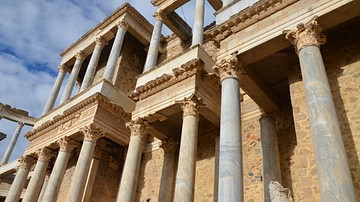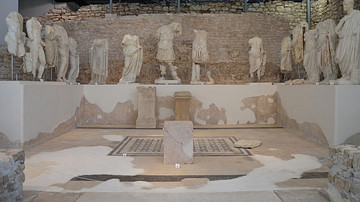Search
Search Results

Article
The Extent of the Roman Empire
Time has seen the rise and fall of a number of great empires - the Babylonian, the Assyrian, the Egyptian, and lastly, the Persian. Regardless of the size or skill of their army or the capabilities of their leaders, all of these empires fell...

Article
Treasures of Roman Tunisia - 10 Key Sites Explored
Set on the North African coast, Tunisia is home to some of the finest Roman ruins in the Mediterranean. After the fall of Carthage, Rome transformed the region into the prosperous province of Africa, enriched by its fertile plains and bustling...

Definition
Roman Legionary
The Roman legionary was a well-trained and disciplined foot soldier, fighting as part of a professional well-organized unit, the legion (Latin: legio), established by the Marian Reforms. While major tactical changes appeared during the final...

Definition
Roman Mythology
The ancient Romans had a rich mythology and, while much of it was derived from their neighbors and predecessors, the Greeks, it still defined the rich history of the Roman people as they eventually grew into an empire. Roman writers such...

Definition
Roman Invective
Roman invective (uituperatio lat.) was the rhetorical and literary genre that aimed at systematically and publicly blaming a political foe to set him aside from the whole community and turn the audience against him during judicial, forensic...

Article
Why Was Fascism Obsessed With Sports?
Can physical education be part of a totalitarian project to control and reshape the masses? Both the leader of Fascist Italy, Benito Mussolini (1883-1945), and the leader of Nazi Germany, Adolf Hitler (1889-1945), believed that sports could...

Article
The Batavian Revolt
Batavian revolt was a rebellion of the Batavians against the Romans in 69-70 CE. After initial successes by their commander Julius Civilis, the Batavians were ultimately defeated by the Roman general Quintus Petillius Cerialis. The year...

Article
Top 5 Roman Sites in Southern Spain
Almost 700 years of continuous Roman occupation have left impressive traces in the Spanish landscape. Spain was then known as 'Hispania' and is now a fascinating location for the archaeological traveller. The Spanish provinces were amongst...

Video
CHS Docent Cont. Education: The Portuguese Empire, AD 1415 to 1668
This video is brought to you by The Friends of Coronado Historic Site © https://www.kuaua.org/ Our Friends on Facebook: https://www.facebook.com/Friends-of-the-Coronado-Historic-site-528159447647644/ ABOUT THE SITE Coronado Historic...

Definition
Roman Imperial Cult
The Roman imperial cult was the practice of venerating Roman emperors and their families as having divine attributes, honoring their contributions to the spread of Roman religion and culture. It was instituted by the first Roman emperor Augustus...